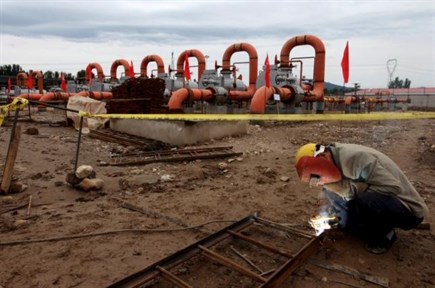China needs market reform, emission rules to boost gas use

A laborer welds a steel frame next to natural gas pipes at a receiving terminal on the outskirts of Beijing, in this September 23, 2013 photo. Photo courtesy of Reuters.
(Reuters) China needs broader market reform and tighter emission regulations to promote natural gas as the most effective fuel to cut its emissions, industry executives said on Wednesday.
The world's largest energy user's ambition to spur gas use is hitting snags because of an inflexible pricing mechanism, lack of market access by independent players and infrastructure limitations, they said.
As the economy slows, gas demand in the world's third-largest user has fallen to the lower single digits in the past two years, a far cry from the heady years between 2004 and 2013 when demand jumped five-fold.
Wider market reform from exploration and production to distribution is required to unlock supplies of the cleaner burning fuel, and stricter emission regulations will help boost the appeal of gas versus coal, which powers nearly three quarters of China's electricity supply.
"Regulations need to be advanced, especially on emission controls. As long as the policy makers send the right signals the industry will respond," said Mel Ydreos, executive director of public affairs of the International Gas Union, on the sidelines of G20 energy ministers meeting.
Xu Wenrong, president of CNPC, called for the government to further reform domestic gas pricing and give policy support for its greater use.
China currently sets its city-gate wholesale natural gas prices via a link with alternative fuels, but official price adjustments often lag changes in oil prices. The government last cut gas prices in November last year.
In competing against coal, which supplies some 64% of the country's energy needs and is the main contributor to carbon emissions and air pollution, the government should make the polluter pay a higher cost, either by pricing carbon or implementing a carbon tax, said IGU's Ydreos.
China is set to launch a national carbon market next year, building on seven pilot regional markets, while a carbon tax appears to be shelved as it requires a lengthy legislative process and has a wider impact on industries already struggling.
"The government should be responsible for compensating gas for its much lower emissions," Wang Zhigang, senior vice president of Sinopec, told the same forum.
The industry also called for a level playing field for natural gas versus renewables for electricity generation.
China has granted generous subsidies for power generated from wind and solar plants, unleashing rapid expansions and more recently idled capacity as much has failed to get connected to grids. Few incentives were offered to gas, industry officials said.
Reporting by Chen Aizhu and Kathy Chen, editing by William Hardy

- RWE strengthens partnerships with ADNOC and Masdar to enhance energy security in Germany and Europe
- TotalEnergies and Mozambique announce the full restart of the $20-B Mozambique LNG project
- Five energy market trends to track in 2026, the year of the glut
- Venture Global wins LNG arbitration case brought by Spain's Repsol
- Trinity Gas Storage reaches FID on Phase II expansion



Comments